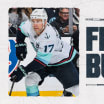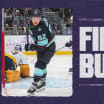SEATTLE -- When NHL Seattle CEO Tod Leiweke introduced the team's first-ever GM, Ron Francis, on July 18, he paused to savor one special category of achievement.
"A few weeks before his 22nd birthday, Ron was named team captain [of the Hartford Whalers], which is truly extraordinary," said Leiweke. "Here's perhaps my favorite statistic, he was the captain of three teams [Hartford, Pittsburgh and Carolina] during his 23 years in the NHL. Fourteen seasons across three teams, his players and coaches selected him to be captain."
Wearing the 'C'
Hockey captains are more relevant than in any other sport and we've got the evidence
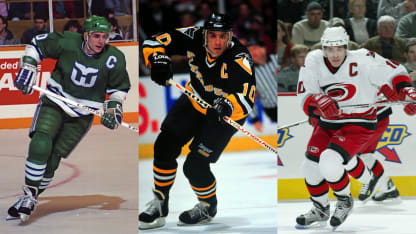
Hockey captains are more consistently impactful than in any other professional sport. For one thing, they have specific rights as stated by Rule 6.1 in the NHL's "Official Rules" book:
"One Captain shall be appointed by each team, and he alone shall have the privilege of discussing with the Referee any questions relating to interpretation of rules which may arise during the progress of a game. He shall wear the letter "C," approximately three inches in height and in contrasting color, in a conspicuous position on the front of his sweater."
But captaincy in the NHL and across the hockey universe has a much deeper ethos. The successful hockey captain is always a leader by example, whether naturally vocal or not.
Hockey captains who prosper are team-first and me-last. They are motivators and mediators and constant hustlers, doers of the little things that win playoffs series: blocking shots, killing penalties, deflecting a puck into the net with two defenders knocking you off balance.
Here's what Paul Holmgren, former Flyers player and GM, said about Bobby Clarke who captained Philadelphia to two Stanley Cup wins during the 1970s: "His work ethic embarrassed everyone else. That's leadership."
Captaincy is firmly rooted in the sport's history. Some teams allow players to vote for their captains. Montreal legendary center Jean Beliveau was a 10-year captain with five Stanley Cups wearing the "C," but he needed a second round of balloting to win the election. Other teams go with the coaching staff's choice, often with input from the general manager.
Recently, some teams have stood down from naming a captain, going instead with three alternate captains (Hockey 101 tip: do not call them assistant captains) who can consult with the referee when on the ice. FYI, a team with a captain can only name two alternate captains.
But a team needs a captain, and here's all the evidence you need: No team without captain has won the Stanley Cup since 1972 or just a bit shy of 50 years ago.
Captains play what Francis calls "a 200-foot" game to signify playing offense and defense. And captains tend to play every game humanly possible. Pierre Pilote, captain of the 1963 Stanley Cup champion Chicago Blackhawks, voraciously contributed on both ends of the ice for six straight seasons, never missing a game or even a shift while logging top minutes played.
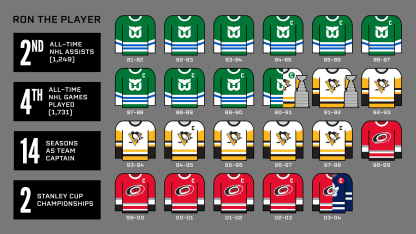
Dynasty NHL teams such as the 1950s Montreal Canadiens and 1980s New York Islanders were helmed on ice by Hall of Fame captains with larger-than-life personas. Maurice "Rocket" Richard captained those Canadiens to the last four of five straight Cup victories, voted in by teammates in his 15th NHL season after famously figuring out how to tone down his world-class hothead temper.
The Islanders won four consecutive Cups in the early 1980s with Denis Potvin as captain and a hard-charging offensive-minded defenseman who rarely botched his defensive duties. And he never missed a chance to make headlines with quotes to reporters. The Isles won the Cup in Potvin's first year as a captain who perhaps proved his effectiveness as a high-performance leader by becoming the ultimate villain to rival New York Rangers fans. To this day, it is not unusual to hear a derisive jeer about Potvin yelled out during a Rangers home-even if the Islanders are not the opponent.
Sam Walker is a former Wall Street Journal sports reporter (he founded its sports section) who studied sports dynasties as a side passion during his 11 years with the newspaper and digital site. He developed a system for picking the best sports dynasties of all-time, then proceeded to determine what factor was most important to such a long run of success.
His answer: Captains are the common denominator among such worldwide dynasties as the Boston Celtics (1956-69), New York Yankees (1949-55), Pittsburgh Steelers (1974-80), New Zealand All Blacks Rugby union (1986-90), FC Barcelona (2008-13) and the Richard-led Montreal Canadiens (1956-60). Yes, the Michael Jordan Bulls of the 1990s is missing from Walker's.
"It's not what you think," said Walker to National Public Radio when on tour for his 2018 book The Captain Class: A New Theory on Leadership. "I think if we were asked to construct a captain in a laboratory, we would pick a superstar. We'd pick someone who is charismatic, a celebrity. But what I discovered was the great captains of these teams were not obvious people."
"They did the grunt work. They had other surprising characteristics, like they embraced dissent and conflict inside their teams. And they had incredible emotional control."
You might say captains are the serious type. In fact, Chicago teammates call Jonathan Toews "Captain Serious." Toews was named captain before the start of the 2008-2009 NHL season. At 20, he was the third youngest captain ever. He gets immense credit from all sectors in the Blackhawks organization for leading the club to three Stanley Cups in six years (2010, 2013, 2015). While teammates recall their captain conducting interviews in fluent English and French (he grew in a French-speaking enclave in Winnipeg) and reaching out to teammates down on the luck and ice time, what fans saw was the straight man for the more boisterous Patrick Kane.
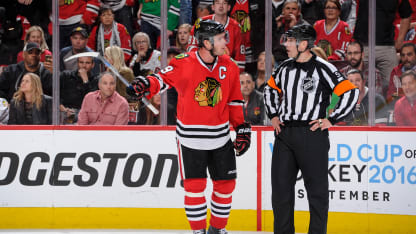
© Bill Smith/Getty Images
"That's maybe something that I've learned to step outside of my own world a little bit as I've gone along in my career," Toews said before the 2015 Final. "What makes you a successful hockey player and successful person is you're able to kind of widen your focus and understand your teammates a little bit more. To understand the dynamic of the locker room, it's no simple thing. You continue to try to learn every day. Try to understand what your teammates go through, especially some guys who are going through tough times."
Mark Messier was inducted into the Hockey Hall of Fame the same year as Seattle GM Francis. Their statistics are remarkably similar in all-time great sorts of ways. Messier took over the Edmonton Oilers captaincy when Wayne Gretzky was traded to Los Angeles. Then Messier was a Stanley Cup-winning captain for the 1994 New York Rangers, ending a 54-year drought. Messier stands as the only player to win Cups as captain of two different teams.
"I think in the end, it's just trying to help people realize their potential and figure out how to motivate them," Messier once explained to a reporter. "You have to get to know a player on a much deeper level than just hockey. … In the end, they have to know the only thing that matters to both of you is trying to find a way to win, and that you don't have any ulterior motives against them. You're just trying to find out how to get the best out of them, and they respect that."











